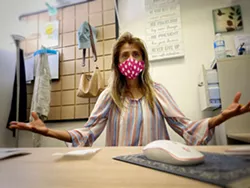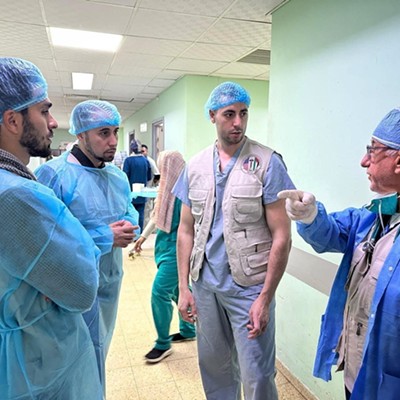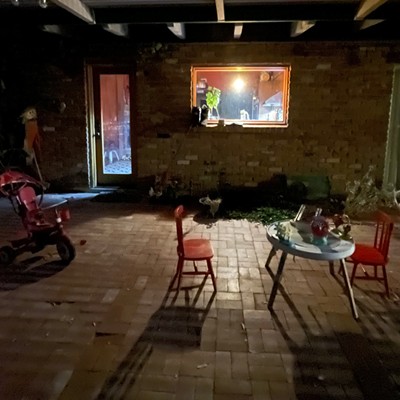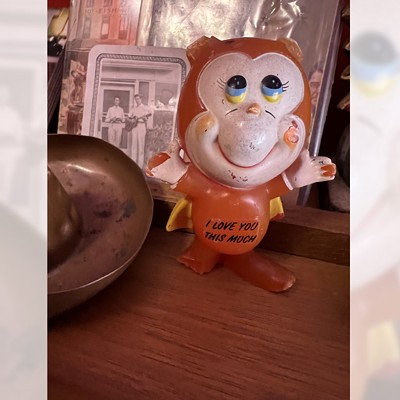A sign on the glass out front clearly states all customers must wear a mask. This guy steps in, refuses to wear one, "blah-blah ...it's my constitutional right ... blah-blah," the moronic lingo of the sanctimonious. She asks him to leave.
He growls at her, "You are going to have a war on your hands."
You are going to have a war. That place where a disenchanted right-wing dude gets bitter by the remedies of his existence, keen to wage war on a petite, brown-skinned woman over the "pro-life" safety of a piece of facial cloth, as if whatever internal benevolence had asphyxiated in the fat of his belly.
Well, a war had already started for Lisa Desiderio. She is not going to tolerate such threats to public safety. Not inside her store, a little shipping center, tucked in a strip mall at Sunrise and Swan where she has run things for 25 years this August. She has already lost a friend, Dan Amaro, a UPS supervisor, to COVID-19.
On a recent early Sunday morning, someone cracked open the steel padlock of the shop's portable storage unit out back, the smaller one perched between two sheds belonging to other shops in the plaza. They got in. When she opened the door and realized what had happened she collapsed inside that hot storage container and screamed.
Only thing of monetary value stolen was a chipped amethyst stone, a souvenir from the Tucson Gem Show, but it was a particularly cruel heist. A thief or thieves absconded with a few shipping documents and many archaeological relics of Desiderio's lost lives, profound in their emotional significance and reprieves. Some items even too painful to store at her home. An Old Testament bible with her father's hand-scrawled notes inside and letters from her parents. Her son Freddie's first pillow, his first pair of shoes, bronzed. His clothes. His baby box filled of keepsakes. Sifted-through boxes, mostly things once belonging to Freddie, gone. Two stored computers stayed put.
See, Freddie died nearly five years ago at age 32, the oldest of Desiderio's two sons. These were his things, all she had of him, a fortune worthless in another's hands. She can't think of a single person in the world who could do such a thing, a direct attack seemingly aimed to hurt her.
A surveillance video captured from the plaza's backside reveals little, only a section of the back lot. The person or persons must have known this and skirted view, what's identifiable is some kind of vehicle pulling up at 4 a.m.
Desiderio is sitting in her windowless back office, its workaday flatness cheery with humble ornaments, stay-positive adages and photos of her with her two sons, these mementoes to single motherhood, to love, a subtle war on the monotony of daily tasks. It is Saturday, her day off, and the air around her seems soft; her flowered open-toe wedges, matching sun-yellow nail polish on fingers and toes, jean cut-offs, and pink polka-dot mask create a show of sunshine. She is polite, and conscientious, to strangers and customers, and her presence is obvious. She is organized in that way single mothers can understand, effectual, makes her work invaluable to her company bosses. Her inner losses are compact yet familiar, stored and contained but not in the way you can screw a lid on a jar. The 53-year-old spends parts of her days running or cycling, and it shows in her slender, athletic build. Deep-set eyes transmit hard truths, eye contact inescapable, and she seems to understand this and diffuses otherwise serious life commentary with bursts of laughs and eager hand gestures.
This office has seen some personal stuff go down, stay in one place 25 years, and it adds up. She was here when the officer informed her years ago that her 51-year-old mother had died of a heart attack. Here she had conversations with her friend who died of COVID-19. Here she suffered through the death of her father, her son Freddie. Desiderio had a boyfriend of 10 years, once married they divorced a year later. A murder on the husband's side of the family split the union. "He just changed," she says, her tone cool yet sad. Now the robbery.
It is a room stamped with industriousness inside a store that has secured her life, and she is grateful, "blessed" for the employ. The company takes care of her, she says, a good living wage and autonomy inside a corporate structure. She is general manager of a similar store in Show Low, Arizona, helping a young woman there run the place. "I was there once. She'll look back and remember me."

She says, "What brings me joy is when I interview and hire a new employee. I get to help someone."
She is a self-critical migraine sufferer who becomes animate talking about sons Freddie and Aaron. And by all accounts Freddie was smart, charismatic, and woefully misunderstood. The kind of kid who'd attend The Rocky Horror Picture Show at midnight dressed to the hilt. He worked in hair salons and for Mac cosmetics. "He was the perfect person to go shopping with," she laughs. "He'd help me dress and do my makeup. I miss that."
Desiderio birthed Freddie at 16, a high-school girl in love with a boy two years younger. That boy grew up in a macho culture and his resentments kept him distanced from his gay son Freddie, but his parents helped. "They were a blessing," she says. "Freddie never went without." Desiderio would bring Freddie to high school with her, and her mother volunteered in the nursery to help care for the boy.
This daughter of a lawn-service man says she learned values from her church-going grandmother, who raised her, grades one through six, in a barrio in working-class Madera, California, just northeast of Fresno. Lisa's parents were not the most organized, and she agrees with the term Mexican hippies.
A couple of dutiful masked teenagers work the counter out front, clicking seamlessly together, packaging, shipping, filling locked boxes with mail, taking orders for personal business cards. Someone ships something every few minutes out of this place. "Have a great day," and "See you soon," addressing some customers by their first names. They each show respect for their work and work mother. She runs a tight ship; she hired them, keeps them and other employees on here, and safe, when work is scarce elsewhere.
By the time Desiderio arrived in Tucson in the early 1990s, to visit a brother who moved here with his wife, she had her second son, Aaron. On that visit, Aaron's father left the family and bolted back to California. She never saw him again. No child support, nada.
"We had an argument over something small and he left," she says, half-laughs, "but it really was a good thing."
She stayed in Tucson with her brother, worked at his eastside deli. Found success selling burritos door-to-door to nearby offices. ("I was called the burrito girl.") She saved, landed an apartment, began working two jobs. Others noticed her hard-work ethic.
"In those days working two minimum-wage jobs was good. I looked back and I thought I had a lot of money." The jobs led her to this shipping center. She knew how to ship, work with customers. Here she learned everything on the fly, expense reports, payroll, management. Freddie was six years older than Aaron, could help get him to school. A friend helped babysit.
In ensuing years, Desiderio began taking care of her parents too. She tells how growing up, dad would vanish for long periods of time on "vacation." She laughs. Adds, "he persevered." Her alcoholic father outlived her mother, died of cirrhosis.
"You don't choose your parents," she says. "But my mother taught us to love each other." A testimony to the close relationships she shares with her two brothers.
Cruel bullying of Freddie began in earnest in middle school, so mom moved the family to an apartment in the Catalina Foothills to get into a better school district. But the torment worsened at the supposedly more progressive Catalina Foothills High, so it was back to the eastside schools, in and out. "He was only trying to find himself," she says.
Tragedy swirled around Freddie. His best friend fatally shot herself in junior high, an accident. His first true love died at 21, a freak heart attack in the shower. Freddie and his mother were devastated. "I had dinner with them the night before," she says. "They had just moved into their first apartment together and we were celebrating. I just adored him."
Debilitating depression (and, later, neuropathy) gorged on Freddie's emotional well-being and it wasn't long before prescription-happy doctors propped him up on myriad drugs, including morphine. She has no kind words for the doctors and their prescription pads. He self-medicated with drink too.
Desiderio's son expired in his sleep inside his downtown apartment. The autopsy concluded natural causes, not O.D., not suicide. His heart just stopped. A heart his mother and brother say was big. What does it take to stop a big heart?
Freddie's death nearly did her in, led her "to the bottle." Her son Aaron came and "looked at me and said 'I'm going to move in.' He said he didn't want to lose me. He moved in and changed his whole life around." Her eyes well up. "I stopped drinking."
The single woman leans toward sunny summations now, anchors meaning of the importance of life to her remaining son, who is doing well in a new job. "What keeps me going is Aaron is still in this world." Her voice hushes, she leans forward for emphasis, sinuous, yellow-polished hands flat on her spare desk, and says, "Where was God in all of this? He blesses the bad people but what about those trying to do good? Where is the mercy?"
She stands to reveal a gnarly strawberry scab on her knee, and laughs. "I was on my run yelling at the universe and the universe yelled back. I fell right down on my face."
Affixed to The UPS Store's front window is a child's crayon sketch, a tender juxtaposition against the utilitarian backdrop. It shows a rainbow flanked by two clouds and a shining sun, depicting a world of inclusion. Near that hangs a COVID-19 mask warning. Near that hangs a different kind of notice: A mother's plea for the return of mementoes of her dead parents and son.
A reward is offered, no questions asked.
"Freddie lived life," Desiderio says. "I'm glad he did all the things I told him not to. He had fun. He danced and he laughed. Now I go to sleep and I have these dreams ... I am asking for mercy. Just give me those personal items back." ■
If anyone has info on the stolen items, email Lisa Desiderio at The UPS Store: store2362@theupsstore.com.







